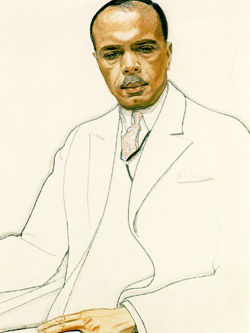 Countee Cullen (1903-1946) He was a poet, anthologist, novelist, translator, children's writer, and playwright. He was also something of a mystery. He was born 30 March 1903, but it has been difficult for scholars to place exactly where he was born, with whom he spent the very earliest years of his childhood, and where he spent them. Cullen won more major literary prizes than any other black writer of the 1920s. He was a true crossover artist. He was a black man with considerable academic training who could, in effect, write "white" verse-ballads, sonnets, quatrains, and the like--much in the manner of Keats and the British Romantics, with a racial undertone and genuine skill. http://afroamhistory.about.com/od/counteecullen/p/bio_cullen_c.htm
Countee Cullen (1903-1946) He was a poet, anthologist, novelist, translator, children's writer, and playwright. He was also something of a mystery. He was born 30 March 1903, but it has been difficult for scholars to place exactly where he was born, with whom he spent the very earliest years of his childhood, and where he spent them. Cullen won more major literary prizes than any other black writer of the 1920s. He was a true crossover artist. He was a black man with considerable academic training who could, in effect, write "white" verse-ballads, sonnets, quatrains, and the like--much in the manner of Keats and the British Romantics, with a racial undertone and genuine skill. http://afroamhistory.about.com/od/counteecullen/p/bio_cullen_c.htm
Langston Hughes (1902-1967) One of Hughes' finest essays appeared in the Nation in 1926, entitled The Negro Artist and the Racial Mountain. It spoke of Black writers and poets, "who would surrender racial pride in the name of a false integration," where a talented black writer would prefer to be considered a poet, not a black poet, which to Hughes meant he subconsciously wanted to write like a white poet. Hughes argued, "No great poet has ever been afraid of being himself." In the forty-odd years between his first book in 1926 and his death he devoted his life to writing and lecturing.
http://www.redhotjazz.com/hughes.html

Zora Neale Hurston (1889-1948) Appearing at the height of the Harlem Renaissance during the 1930s, Zora Neale Hurston was the preeminent black woman writer in the United States. She worked with Langston Hughes and was a fierce rival of Richard Wright. Her stories appeared in major magazines, she was consulted on Hollywood screenplays, she penned four novels, an autobiography, countless essays, and two books on black mythology. Yet by the late 1950s, Hurston was living in obscurity, working as a maid in a Florida hotel. She died in 1960 in a Welfare home, was buried in an unmarked grave, and quickly faded from literary consciousness until 1975 when Alice Walker almost single-handedly revived interest in her work. Their Eyes Were Watching God is generally considered to be Hurston's most powerful novel that was adapted for a television movie of the same name starring Halle Berry and produced by Oprah Winfrey in 2005. http://www.zoranealehurston.com/
 James Weldon Johnson (1871-1938) He was a songwriter, poet, novelist, journalist, critic, and autobiographer. James Weldon Johnson, much like his contemporary W. E. B. Du Bois, was a man who bridged several historical and literary trends. Over the course of his sixty-seven years, Johnson was the first African American admitted to the Florida bar since the end of Reconstruction; the co-composer of 'Lift Every Voice and Sing,' the song that would later become known as the negro national anthem; field secretary in the NAACP; journalist; publisher; diplomat; educator; translator; librettist; anthologist; and English professor; in addition to being a well-known poet and novelist and one of the prime movers of the Harlem Renaissance. http://www.english.illinois.edu/Maps/poets/g_l/johnson/life.htm
James Weldon Johnson (1871-1938) He was a songwriter, poet, novelist, journalist, critic, and autobiographer. James Weldon Johnson, much like his contemporary W. E. B. Du Bois, was a man who bridged several historical and literary trends. Over the course of his sixty-seven years, Johnson was the first African American admitted to the Florida bar since the end of Reconstruction; the co-composer of 'Lift Every Voice and Sing,' the song that would later become known as the negro national anthem; field secretary in the NAACP; journalist; publisher; diplomat; educator; translator; librettist; anthologist; and English professor; in addition to being a well-known poet and novelist and one of the prime movers of the Harlem Renaissance. http://www.english.illinois.edu/Maps/poets/g_l/johnson/life.htm Claude McKay (1890-1948) A poet, novelist, and journalist, was born Festus Claudius McKay in Sunny Ville, Clarendon Parish, Jamaica. Booker T. Washington heard reports of McKay’s creative exploits and invited McKay to enroll at Tuskegee Institute in Alabama. In the state of Alabama he, for the first time had to deal with the reality of American racism. This encounter with racism would form the basis for much of his subsequent writing.
Claude McKay (1890-1948) A poet, novelist, and journalist, was born Festus Claudius McKay in Sunny Ville, Clarendon Parish, Jamaica. Booker T. Washington heard reports of McKay’s creative exploits and invited McKay to enroll at Tuskegee Institute in Alabama. In the state of Alabama he, for the first time had to deal with the reality of American racism. This encounter with racism would form the basis for much of his subsequent writing.http://www.english.illinois.edu/Maps/poets/m_r/mckay/mckay.htm
No comments:
Post a Comment